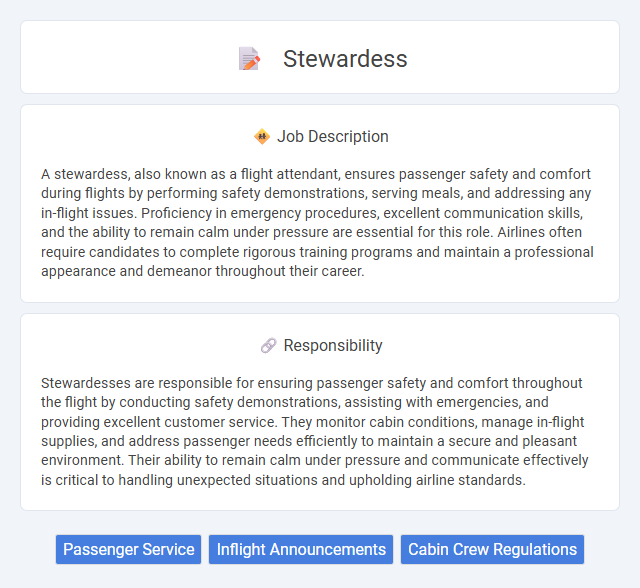
A stewardess, also known as a flight attendant, ensures passenger safety and comfort during flights by performing safety demonstrations, serving meals, and addressing any in-flight issues. Proficiency in emergency procedures, excellent communication skills, and the ability to remain calm under pressure are essential for this role. Airlines often require candidates to complete rigorous training programs and maintain a professional appearance and demeanor throughout their career.
Individuals who enjoy social interaction and remain calm under pressure are likely to be well-suited for a stewardess job. Those with good communication skills and physical stamina probably adapt better to the demands of irregular hours and extended periods of standing. People who prefer routine and limited social contact may find this career less suitable.
Qualification
A stewardess must possess a high school diploma or equivalent, with many airlines preferring candidates with additional certifications in hospitality or customer service. Proficiency in multiple languages, excellent communication skills, and the ability to handle emergency procedures are essential qualifications. Physical fitness, a professional appearance, and completion of airline-specific training programs are critical for success in this role.
Responsibility
Stewardesses are responsible for ensuring passenger safety and comfort throughout the flight by conducting safety demonstrations, assisting with emergencies, and providing excellent customer service. They monitor cabin conditions, manage in-flight supplies, and address passenger needs efficiently to maintain a secure and pleasant environment. Their ability to remain calm under pressure and communicate effectively is critical to handling unexpected situations and upholding airline standards.
Benefit
A stewardess job likely offers competitive benefits such as comprehensive health insurance and travel perks, including discounted or free flights. There is a strong probability of receiving flexible schedules that accommodate personal time and work-life balance. The role may also provide opportunities for career advancement and professional development within the aviation industry.
Challenge
The job of a stewardess likely involves managing high-pressure situations and adapting quickly to unexpected challenges, such as medical emergencies or difficult passengers. Navigating long hours with irregular schedules may contribute to physical and mental fatigue, requiring strong resilience. Effective communication and problem-solving skills might be essential for maintaining safety and comfort during flights.
Career Advancement
Stewardess careers offer multiple pathways for advancement, including promotions to senior flight attendant, purser, or cabin manager roles, where leadership and operational oversight responsibilities increase. Gaining additional certifications in safety procedures, multilingual communication, and customer service excellence enhances eligibility for specialized positions such as corporate flight attendant or training instructor. Continuous professional development, accrued flight hours, and strong interpersonal skills contribute significantly to career growth within the aviation industry.
Key Terms
Passenger Service
Stewardesses play a vital role in ensuring exceptional passenger service by attending to travelers' needs, providing safety instructions, and delivering a comfortable in-flight experience. Their responsibilities include assisting with boarding, addressing special requests, and managing in-flight amenities to enhance customer satisfaction. Effective communication and a calm demeanor are essential for handling emergencies and resolving passenger concerns promptly.
Inflight Announcements
Inflight announcements by stewardesses ensure passenger safety and comfort by clearly communicating safety procedures, flight updates, and service information. Precise and professional delivery of announcements minimizes passenger confusion and enhances the overall travel experience. Mastery of effective inflight communication is essential for maintaining order and addressing passenger needs promptly during the flight.
Cabin Crew Regulations
Stewardesses must adhere strictly to international Cabin Crew Regulations established by aviation authorities such as the International Civil Aviation Organization (ICAO) and the Federal Aviation Administration (FAA). These regulations govern safety procedures, emergency protocols, passenger assistance, and in-flight service standards to ensure a secure and comfortable travel experience. Compliance with updated training requirements and certifications is essential for maintaining operational readiness and passenger safety.
 kuljobs.com
kuljobs.com